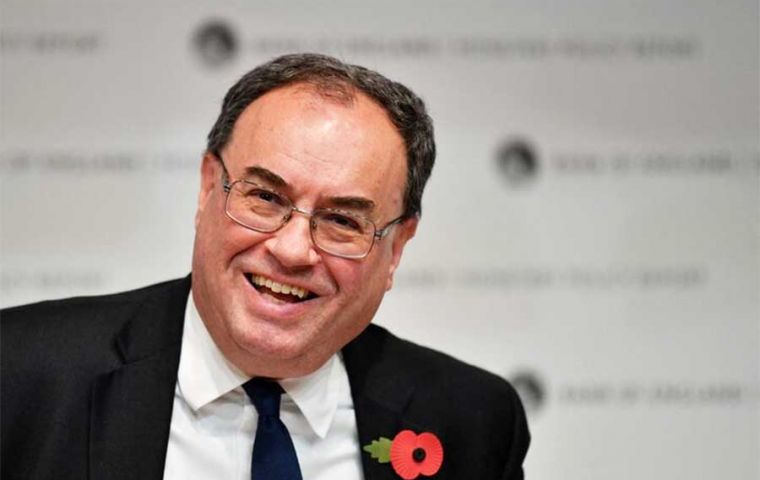MercoPress. South Atlantic News Agency
Bank of England cut the key interest rate to 4.75%, but anticipates a more cautious approach to further trims
 BOE Governor Andrew Bailey said the bank sees inflation rising by 0.5 percentage points, to hit a high of around 2.75% in 2025 before falling back to its 2% target.
BOE Governor Andrew Bailey said the bank sees inflation rising by 0.5 percentage points, to hit a high of around 2.75% in 2025 before falling back to its 2% target. The Bank of England in an almost unanimous decision cut interest rates by 25 basis points on Thursday, a boost relief for mortgage holders, but also raised its inflation forecast following on Labor’s government budget and global uncertainty, which most probably conditions future policy easing.
The BOE’s Monetary Policy Committee voted 8-1 in favor of the decision to bring the bank’s key rate to 4.75%. It marks the central bank’s second such trim this year, after it began its easing cycle in August.
Policymakers pointed to a continued easing of inflation as a factor influencing their decision, (slightly below the 2% target) but noted that the government’s fiscal plan had led to a raise in their forecasts for growth and inflation.
The bank now sees inflation rising by 0.5 percentage points, more than previously forecast, to hit a high of around 2.75% in 2025 before falling back to its 2% target. Growth, meanwhile, is seen increasing by around 0.75% in a year’s time.
BOE Governor Andrew Bailey said the bank would, as such, need to retain a “gradual approach” to policy easing.
“Monetary policy will need to remain restrictive for sufficiently long until the risks to inflation returning sustainably to the 2% target over the medium term have dissipated further,” he said, speaking at a press conference shortly after the rate decision.
Money markets had been pricing in a 97% chance of the quarter-point trim at the November meeting, even as analysts warned that subsequent cuts could be delayed as a result of the government’s tax-and-spend budget.
“Even though interest rates have further to fall, the upward pressure on inflation from the budget and growing global risks, including possible new U.S. tariffs, could mean that policy is loosened more modestly than many anticipated,” Suren Thiru, economics director at ICAEW, said in a note following the announcement.
Policymakers signaled a “gradual approach” to cuts after holding rates steady at their September meeting. However, economists had upped their expectations of a faster pace of easing following a sharp fall in inflation to 1.7% and a drop off in wage growth prior to the budget.
Those expectations were later dampened after U.K. Finance Minister Rachel Reeves announced £40 billion (US$51.5 billion) in tax hikes and a change to the U.K.’s debt rules, which the Office for Budget Responsibility (OBR) warned could push up near-term growth and inflation.
However BOE’s Andrew Bailey on Thursday at his media conference said Labor’s budget provided a “credible” path to growth and it had not not complicated the bank’s central mission of returning inflation to target.
Bailey said he “strongly” agreed with Labor Finance Minister Rachel Reeves’ efforts to raise the U.K.’s growth rate, adding that it was critical to improving the country’s economic outlook.
“There are many ways to raise potential growth. They have to be credible,” Bailey said, without naming any particular administration.
The central bank governor noted, however, that both Reeves and her predecessor, Conservative Finance Minister Jeremy Hunt, had outlined solid visions to raise U.K. Growth.
“We have, by recent historical standards, low potential growth. If we raise the potential growth rate, the fiscal sustainability issue gets easier,” he said.
“I strongly agree with the chancellor – and actually the previous chancellor as well – that raising the U.K.’s potential growth rate is a way to ease this situation and tackle these very big structural headwinds,” he added, referencing rising global debt levels.




Top Comments
Disclaimer & comment rulesCommenting for this story is now closed.
If you have a Facebook account, become a fan and comment on our Facebook Page!